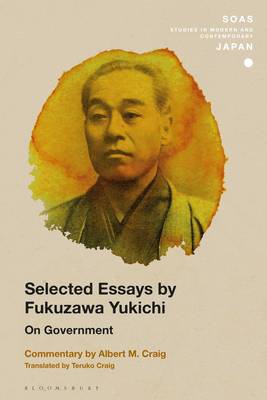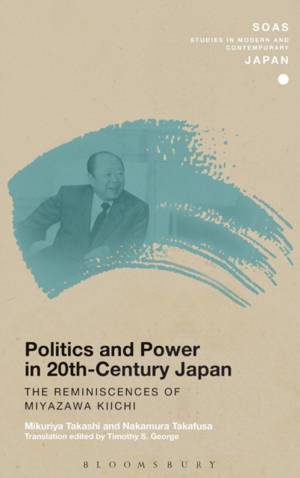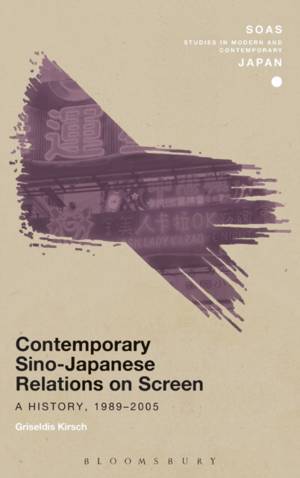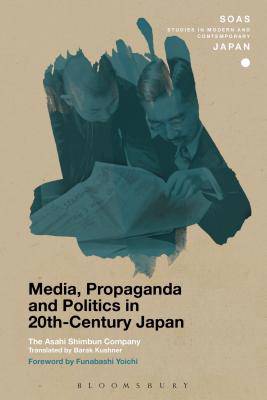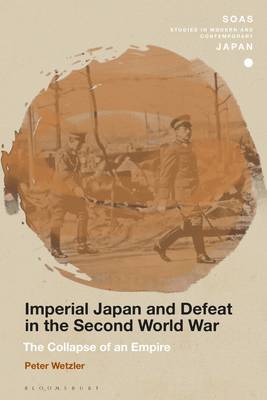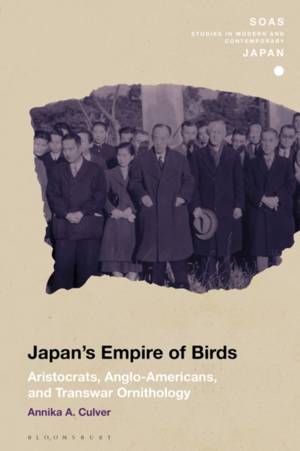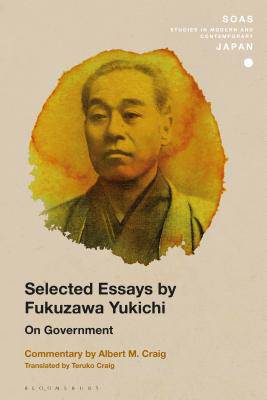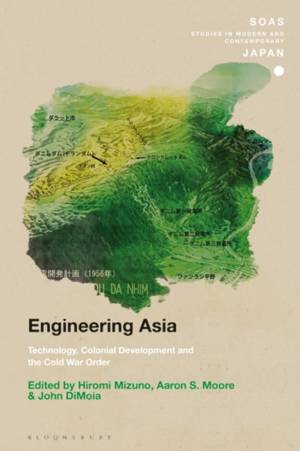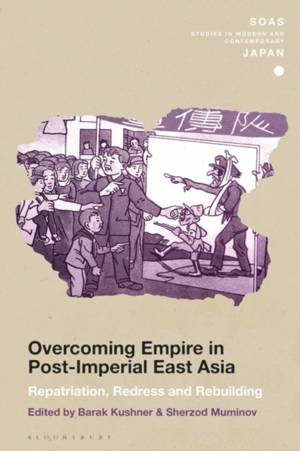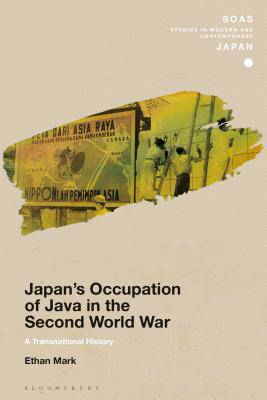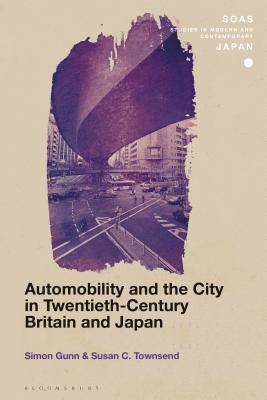
- Retrait gratuit dans votre magasin Club
- 7.000.000 titres dans notre catalogue
- Payer en toute sécurité
- Toujours un magasin près de chez vous
- Retrait gratuit dans votre magasin Club
- 7.000.0000 titres dans notre catalogue
- Payer en toute sécurité
- Toujours un magasin près de chez vous
-
Haruki Murakami and the Search for Self-Therapy
Jonathan DIL
- Livre relié | Anglais | Soas Studies in Modern and Contemporary Japan
- Haruki Murakami, a global literary phenomenon, has said that he started writing fiction as a means of self-therapy. What he has not discussed as much ... Savoir plus
203,95 €Livraison 2 à 3 semaines203,95 €Livraison 2 à 3 semaines -
Selected Essays by Fukuzawa Yukichi
- Livre broché | Anglais | Soas Studies in Modern and Contemporary Japan
- During the sweeping changes taking place in 19th century Japan, no thinker was more important than Fukuzawa Yukichi (1835-1901). Born into a low-ranki... Savoir plus
69,45 €Livraison 2 à 3 semaines69,45 €Livraison 2 à 3 semaines -
Postwar Emigration to South America from Japan and the Ryukyu Islands
Pedro Iacobelli
- Livre relié | Anglais | Soas Studies in Modern and Contemporary Japan
- Placing a distinct focus on the role of the sending state, this book examines the history of postwar Japan's migration policy, linking it to the large... Savoir plus
296,95 €Livraison 2 à 3 semaines296,95 €Livraison 2 à 3 semaines -
Women and Democracy in Cold War Japan
Jan Bardsley
- Livre relié | Anglais | Soas Studies in Modern and Contemporary Japan
- Women and Democracy in Cold War Japan offers a fresh perspective on gender politics by focusing on the Japanese housewife of the 1950s as a controvers... Savoir plus
296,95 €Livraison 2 à 3 semaines296,95 €Livraison 2 à 3 semaines -
Media, Propaganda and Politics in 20th-Century Japan
The Asahi Shimbun Company
- Livre relié | Anglais | Soas Studies in Modern and Contemporary Japan
- This book investigates the role played by the Asahi Newspaper , one of Japan's largest daily newspapers, as a mediator of information and power during... Savoir plus
167,95 €Livraison sous 1 à 4 semaines167,95 €Livraison sous 1 à 4 semaines -
Politics and Power in 20th-Century Japan
Nakamura Takafusa, Mikuriya Takashi
- Livre relié | Anglais | Soas Studies in Modern and Contemporary Japan
- Miyazawa Kiichi played a leading role in Japan's government and politics from 1942 until 2003, during which time he served as Prime Minister, and also... Savoir plus
296,95 €Livraison 2 à 3 semaines296,95 €Livraison 2 à 3 semaines -
Contemporary Sino-Japanese Relations on Screen
Griseldis Kirsch
- Livre relié | Anglais | Soas Studies in Modern and Contemporary Japan
- Japan and China look back on a history of friendship as well as friction, particularly in recent decades. As the People's Republic of China's economy ... Savoir plus
296,95 €Livraison 2 à 3 semaines296,95 €Livraison 2 à 3 semaines -
Media, Propaganda and Politics in 20th-Century Japan
The Asahi Shimbun Company
- Livre broché | Anglais | Soas Studies in Modern and Contemporary Japan
- This book investigates the role played by the Asahi Newspaper , one of Japan's largest daily newspapers, as a mediator of information and power during... Savoir plus
58,95 €Livraison 1 à 2 semaines58,95 €Livraison 1 à 2 semaines -
Imperial Japan and Defeat in the Second World War
Peter Wetzler
- Livre relié | Anglais | Soas Studies in Modern and Contemporary Japan
- Informed Western understanding of Imperial Japan still often conjures up images of militarism, blind devotion to leaders, and fanatical pride in the c... Savoir plus
132,45 €Livraison 1 à 2 semaines132,45 €Livraison 1 à 2 semaines -
Debating Otaku in Contemporary Japan
- Livre broché | Anglais | Soas Studies in Modern and Contemporary Japan
- With the spread of manga (Japanese comics) and anime (Japanese cartoons) around the world, many have adopted the Japanese term 'otaku' to identify fan... Savoir plus
88,45 €Livraison 2 à 3 semaines88,45 €Livraison 2 à 3 semaines -
Japan's Occupation of Java in the Second World War
Ethan Mark
- Livre relié | Anglais | Soas Studies in Modern and Contemporary Japan
- Japan's Occupation of Java in the Second World War draws upon written and oral Japanese, Indonesian, Dutch and English-language sources to narrate the... Savoir plus
296,95 €Livraison 2 à 3 semaines296,95 €Livraison 2 à 3 semaines -
Japan's Empire of Birds
Annika A Culver
- Livre broché | Anglais | Soas Studies in Modern and Contemporary Japan
- As a transnational history of science, Japan's Empire of Birds: Aristocrats, Anglo-Americans, and Transwar Ornithology focuses on the political aspect... Savoir plus
67,95 €Livraison 2 à 3 semaines67,95 €Livraison 2 à 3 semaines -
Selected Essays by Fukuzawa Yukichi
- Livre relié | Anglais | Soas Studies in Modern and Contemporary Japan
- During the sweeping changes taking place in 19th century Japan, no thinker was more important than Fukuzawa Yukichi (1835-1901). Born into a low-ranki... Savoir plus
254,45 €Livraison 2 à 3 semaines254,45 €Livraison 2 à 3 semaines -
Engineering Asia
- Livre broché | Anglais | Soas Studies in Modern and Contemporary Japan
- Weaving together chapters on imperial Japan's wartime mobilization, Asia's first wave of postwar decolonization, and Cold War geopolitical conflict in... Savoir plus
76,45 €Livraison 2 à 3 semaines76,45 €Livraison 2 à 3 semaines -
Overcoming Empire in Post-Imperial East Asia Repatriation, Redress and Rebuilding
- Livre relié | Anglais | Soas Studies in Modern and Contemporary Japan
- When Emperor Hirohito announced defeat in a radio broadcast on 15th August 1945, Japan was not merely a nation; it was a colossal empire stretching fr... Savoir plus
254,45 €Livraison 2 à 3 semaines254,45 €Livraison 2 à 3 semaines -
Japanese Taiwan
- Livre relié | Anglais | Soas Studies in Modern and Contemporary Japan
- Colonial agents worked for fifty years to make a Japanese Taiwan, using technology, culture, statistics, trade, and modern ideologies to remake their ... Savoir plus
296,95 €Livraison 2 à 3 semaines296,95 €Livraison 2 à 3 semaines -
Japan's Postwar Military and Civil Society
Tomoyuki Sasaki
- Livre relié | Anglais | Soas Studies in Modern and Contemporary Japan
- Japan's so-called 'peace constitution' renounces war as a sovereign right of the nation, and bans the nation from possessing any war potential. Yet Ja... Savoir plus
296,95 €Livraison 2 à 3 semaines296,95 €Livraison 2 à 3 semaines -
Japan's Occupation of Java in the Second World War
Ethan Mark
- Livre broché | Anglais | Soas Studies in Modern and Contemporary Japan
- Japan's Occupation of Java in the Second World War draws upon written and oral Japanese, Indonesian, Dutch and English-language sources to narrate the... Savoir plus
79,95 €Livraison 2 à 3 semaines79,95 €Livraison 2 à 3 semaines -
Mass Media, Consumerism and National Identity in Postwar Japan
Martyn David Smith
- Livre relié | Anglais | Soas Studies in Modern and Contemporary Japan
- Mass Media, Consumerism and National Identity in Postwar Japan addresses Japan's evolving nationalism and national identity in relation to its newly r... Savoir plus
271,45 €Livraison 2 à 3 semaines271,45 €Livraison 2 à 3 semaines -
Christianity and Imperialism in Modern Japan
Emily Anderson
- Livre relié | Anglais | Soas Studies in Modern and Contemporary Japan
- Christianity and Imperialism in Modern Japan explores how Japanese Protestants engaged with the unsettling changes that resulted from Japan's emergenc... Savoir plus
296,95 €Livraison 2 à 3 semaines296,95 €Livraison 2 à 3 semaines -
Japanese Taiwan
- Livre broché | Anglais | Soas Studies in Modern and Contemporary Japan
- Colonial agents worked for fifty years to make a Japanese Taiwan, using technology, culture, statistics, trade, and modern ideologies to remake their ... Savoir plus
88,45 €Livraison 2 à 3 semaines88,45 €Livraison 2 à 3 semaines -
Automobility and the City in Twentieth-Century Britain and Japan
Simon Gunn, Susan C Townsend
- Livre relié | Anglais | Soas Studies in Modern and Contemporary Japan
- Automobility and the City in Twentieth-Century Britain and Japan is the first book to consider how mass motorization reshaped cities in Japan and Brit... Savoir plus
254,45 €Livraison 2 à 3 semaines254,45 €Livraison 2 à 3 semaines -
Post-Fascist Japan
Laura Hein
- Livre broché | Anglais | Soas Studies in Modern and Contemporary Japan
- In late 1945 local Japanese turned their energies toward creating new behaviors and institutions that would give young people better skills to combat ... Savoir plus
79,95 €Livraison 2 à 3 semaines79,95 €Livraison 2 à 3 semaines -
Kenkoku University and the Experience of Pan-Asianism
Yuka Hiruma Kishida
- Livre relié | Anglais | Soas Studies in Modern and Contemporary Japan
- Kenkoku University and the Experience of Pan-Asianism makes a fresh contribution to the recent effort to re-examine the Japanese wartime ideology of P... Savoir plus
254,45 €Livraison 2 à 3 semaines254,45 €Livraison 2 à 3 semaines






